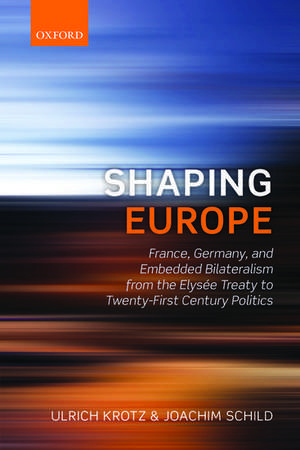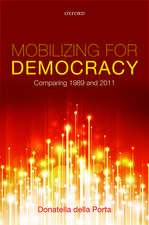Shaping Europe: France, Germany, and Embedded Bilateralism from the Elysée Treaty to Twenty-First Century Politics
Autor Ulrich Krotz, Joachim Schilden Limba Engleză Paperback – 11 feb 2015
| Toate formatele și edițiile | Preț | Express |
|---|---|---|
| Paperback (1) | 315.96 lei 31-37 zile | |
| OUP OXFORD – 11 feb 2015 | 315.96 lei 31-37 zile | |
| Hardback (1) | 733.13 lei 31-37 zile | |
| OUP OXFORD – 19 dec 2012 | 733.13 lei 31-37 zile |
Preț: 315.96 lei
Preț vechi: 342.69 lei
-8% Nou
Puncte Express: 474
Preț estimativ în valută:
60.46€ • 62.74$ • 50.54£
60.46€ • 62.74$ • 50.54£
Carte tipărită la comandă
Livrare economică 04-10 martie
Preluare comenzi: 021 569.72.76
Specificații
ISBN-13: 9780198719489
ISBN-10: 0198719485
Pagini: 354
Dimensiuni: 153 x 234 x 19 mm
Greutate: 0.56 kg
Editura: OUP OXFORD
Colecția OUP Oxford
Locul publicării:Oxford, United Kingdom
ISBN-10: 0198719485
Pagini: 354
Dimensiuni: 153 x 234 x 19 mm
Greutate: 0.56 kg
Editura: OUP OXFORD
Colecția OUP Oxford
Locul publicării:Oxford, United Kingdom
Recenzii
For the 50th anniversary of the Elysée Treaty, Ulrich Krotz and Joachim Schild have provided all students of European and international politics with a special gifta theoretically highly original, empirically rich, and historically informed analysis of Europes most important relationship. This splendid book invites us to explore embedded bilateralism as a distinctive type of international relations. The rewards are fully commensurate with the political occasion this book marks.
[A] stimulating study ... this significant work provokes reflection, and marks a valuable step forward in the study of the EU.
At the core of contemporary Europe lies the bilateral relationship between France and Germany. What accounts for the success of this joint leadership role, and is it likely to continue in the future? Krotz and Schild argue that the success of the Franco-German duo should be seen as the result of creative leadership [that] created a unique symbolic relationship. Franco-German reconciliation became a self-fulfilling prophecy, as publics, politicians, and officials began to expect and promote further cooperation over time.
Krotz and Schild make a powerful argument which should make their study of great interest to scholars of European integration and International Relations... [They] have produced an excellent book, which will become the new standard text for students of Franco-German relations.
Krotz and Schild provide a highly interesting and innovative study explaining the enduring bilateral relationship between France and Germany, and its impact on European integration. Rigorous in analysis and documentation, their book is particularly valuable because it highlights the multiple causes and effects of Franco-German embeddedness in Europe.
[A] precise and comprehensive panorama of the past half century of Franco-German tandem.
Krotz and Schilds book should be highly welcomed by all EU scholars.
Krotz and Schild have done a great service in mapping the current and somewhat fraught Franco-German relationship onto its past ... the book is a careful and respectful piece of scholarship.
This remarkable book, covering a half century of Franco-German relations and European politics, reminds us that the obstacles faced by the two neighbors at the signing of the Elysée Treaty-and at various junctures since-while different, were no less politically momentous and historically significant than the challenges France and Germany encounter today.
[A] stimulating study ... this significant work provokes reflection, and marks a valuable step forward in the study of the EU.
At the core of contemporary Europe lies the bilateral relationship between France and Germany. What accounts for the success of this joint leadership role, and is it likely to continue in the future? Krotz and Schild argue that the success of the Franco-German duo should be seen as the result of creative leadership [that] created a unique symbolic relationship. Franco-German reconciliation became a self-fulfilling prophecy, as publics, politicians, and officials began to expect and promote further cooperation over time.
Krotz and Schild make a powerful argument which should make their study of great interest to scholars of European integration and International Relations... [They] have produced an excellent book, which will become the new standard text for students of Franco-German relations.
Krotz and Schild provide a highly interesting and innovative study explaining the enduring bilateral relationship between France and Germany, and its impact on European integration. Rigorous in analysis and documentation, their book is particularly valuable because it highlights the multiple causes and effects of Franco-German embeddedness in Europe.
[A] precise and comprehensive panorama of the past half century of Franco-German tandem.
Krotz and Schilds book should be highly welcomed by all EU scholars.
Krotz and Schild have done a great service in mapping the current and somewhat fraught Franco-German relationship onto its past ... the book is a careful and respectful piece of scholarship.
This remarkable book, covering a half century of Franco-German relations and European politics, reminds us that the obstacles faced by the two neighbors at the signing of the Elysée Treaty-and at various junctures since-while different, were no less politically momentous and historically significant than the challenges France and Germany encounter today.
Notă biografică
Ulrich Krotz is Professor at the European University Institute, Chair in International Relations and European Politics, both in the Political Science Department and the Robert Schuman Centre for Advanced Studies.Joachim Schild is Professor of Comparative Politics at the University of Trier.












